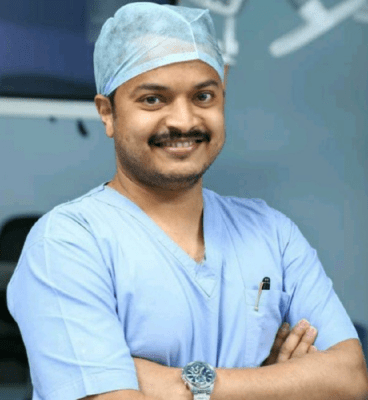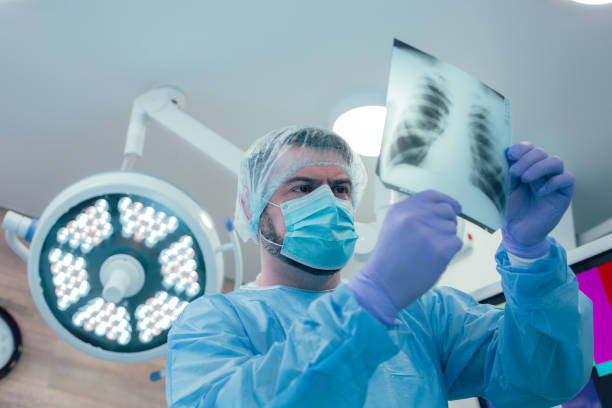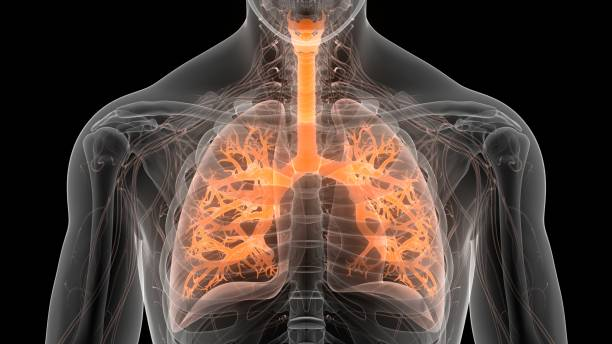Dr. Vivek Mundale

Dr. Vivek Mundale is a dynamic thoracic surgeon in Mumbai with a passion for tackling complex lung and chest conditions. From treating lung and esophageal cancers to mastering intricate tracheobronchial surgeries, Dr. Mundale’s expertise spans a wide spectrum. His approach blends cutting-edge technology, including robotic and minimal-access chest surgery, with patient-centered care.
A former Thoracic Surgery Fellow at Tata Memorial Hospital, Dr. Mundale is highly skilled in advanced minimally invasive procedures like VATS lobectomy and decortication. Now, as an Associate Consultant at Nanavati Max Institute of Cancer Care, he continues to push the boundaries of thoracic surgery, offering innovative solutions for benign lung diseases like aspergilloma, empyema, and bronchiectasis.
Professional Background
Education:
- DNB (Thoracic Surgery) – Sir Ganga Ram Hospital, New Delhi, 2020
- DNB (General Surgery) – Dr. Babasaheb Ambedkar Memorial Hospital, Mumbai, 2014
- MBBS– Lokmanya Tilak Municipal Medical College, Mumbai, 2010
Dr. Vivek Mundale further refined his surgical expertise as a Thoracic Surgery Fellow at Tata Memorial Hospital, one of India’s leading cancer institutions. He has actively participated in significant conferences such as the European Society of Thoracic Surgeons (ESTS) annual meetings, SELSICON 2019, and ISTS CON 2020, where he showcased his work through video, paper, and poster presentations.
His dedication to research is reflected in his co-authored publication, “Predictors of Anastomotic Complications After Resection and Anastomosis for Tracheal Stenosis,” featured in the Indian Journal of Otolaryngology and Head & Neck Surgery in 2020.
Schedule a consultation today. Take the first step towards comprehensive thoracic care tailored to your needs.
Specializations
- Lung cancer and esophageal cancer surgery
- Tracheobronchial surgery
- Bronchoscopy
- Benign lung diseases: Aspergilloma, bronchiectasis, empyema, pneumothorax
- Minimally invasive thoracic surgery: VATS lobectomy, decortication, blebectomy
- Robotic surgery
- Anterior mediastinal and diaphragmatic surgery
Professional experience
- Associate Consultant
Nanavati Max Super Specialty Hospital, Mumbai
Nov 2022 – Present - Associate Consultant Thoracic Surgeon
Medanta – The Medicity, Gurugram
Feb 2021 – Dec 2022 - Resident
N. Cooper Hospital, Mumbai
2014 – 2015
Services Offered

Tracheal Surgery: This specialized procedure addresses conditions affecting the trachea. It ensures proper airflow and breathing by repairing or reconstructing the airway.
Bronchial and Vascular Sleeve Resection: An intricate surgical technique that removes affected segments of the bronchus and associated blood vessels. It helps preserve lung function while treating cancerous lesions.
Bronchoscopy: A diagnostic and therapeutic procedure that allows for direct visualization of the airways. It aids in identifying and treating various pulmonary conditions.
Benign Lung Diseases: Dr. Vivek Mundale is an expert in treating conditions like aspergilloma, bronchiectasis, empyema, and pneumothorax. Tailored surgical solutions are provided to improve lung health.
VATS Lung Resections: This minimally invasive approach utilizes video-assisted thoracoscopic surgery, which allows for precise lung resections. It also reduces recovery time and minimizes postoperative pain.
Minimally Invasive Thoracic Surgery: Includes advanced techniques such as VATS lobectomy, decortication, and blebectomy. These promote quicker recovery and less trauma to the body.
Robotic Surgery: State-of-the-art robotic systems enhance precision in complex thoracic procedures, resulting in smaller incisions and faster recovery times.
Surgery for Post-Tubercular Sequelae: This surgical intervention corrects lung damage caused by tuberculosis. It enhances lung function and improves overall respiratory health.
Anterior Mediastinal and Diaphragmatic Surgery: Focused on addressing conditions in the anterior mediastinum and diaphragm. Specialized techniques are employed to ensure optimal surgical outcomes.
Experience cutting-edge thoracic care that redefines possibilities and sets new standards for recovery and well-being. Book an appointment with an experienced thoracic surgeon today.
Awards
- First Prize ISTS CON 2020 for best thoracic paper
- Second Prize SELSICON 2019 for paper presentation
Membership
- Indian Society of Thoracic Surgeons and Trust
Frequently Asked Questions
A thoracic surgeon treats diseases and conditions affecting the chest, including the lungs, esophagus, trachea, diaphragm, and chest wall. This includes cancers, benign tumors, infections, and issues like pneumothorax or bronchiectasis, often through minimally invasive or robotic surgery.
You should see a thoracic surgeon if you have conditions affecting the chest, such as lung cancer, esophageal cancer, tracheal or airway disorders, chest infections, or benign lung diseases like bronchiectasis. Also, consult a thoracic surgeon if you need surgery for chest trauma, persistent chest pain, or conditions like pneumothorax or empyema.
Thoracic surgery can be done through open surgery or minimally invasive methods like Video-Assisted Thoracoscopic Surgery (VATS) or robotic surgery. These techniques use small incisions, specialized tools, and cameras, leading to quicker recovery and less pain.
To choose a thoracic surgeon, consider their experience, especially in treating your specific condition. Look for board certification, advanced training in minimally invasive techniques, and a strong track record of successful outcomes. Patient reviews, referrals from trusted doctors, and the surgeon’s hospital affiliation can also help guide your decision.
Thoracic surgery is considered high risk because it involves operating on vital organs in the chest, like the lungs, heart, and major blood vessels. These structures are crucial for breathing and circulation, so complications such as bleeding, infection, or lung function issues can be serious. The proximity to critical structures and the complexity of the procedures also add to the risk.
The risks of thoracic surgery include infection, bleeding, lung complications (such as pneumonia or collapsed lung), blood clots, and reactions to anesthesia. Other potential risks are prolonged air leaks, difficulty breathing, or heart complications. The severity of these risks depends on the complexity of the surgery, the patient’s overall health, and the specific condition being treated.
Disclaimer: The information shared in this content is for educational purposes only and not for promotional use.

